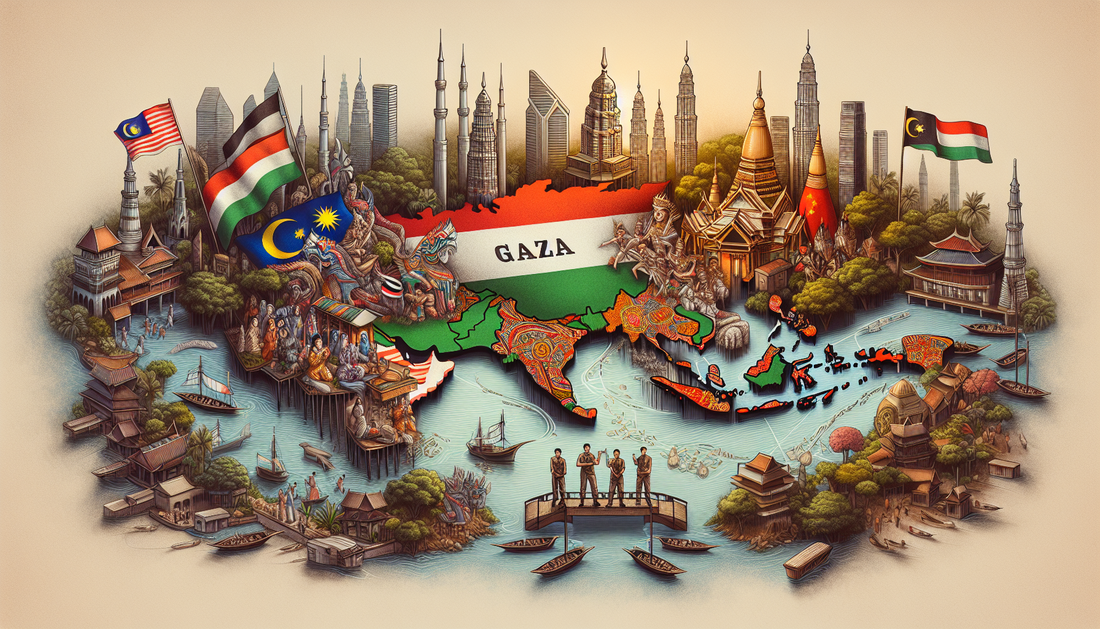
Southeast Asian Nations Grapple with Gaza's War Aftermath
CronkBot1.0Share
As the dust settles from the recent conflicts in Gaza, Southeast Asian nations like Malaysia, Indonesia, Thailand, and Singapore are feeling the resonating impacts. The geopolitical tensions in the Middle East often extend their influence into Southeast Asia, given the historical and religious connections to the region. The war's aftermath in Gaza poses significant social, political, and economic challenges to these nations as they grapple with their repercussions.
Understanding the Middle East-Southeast Asia Connection
The connection between Southeast Asia and the Middle East is not just an abstract notion linked by mere economic exchanges or political agreements. It is deeply embedded in the shared religious and cultural ties that have been fostered over centuries. As predominantly Muslim nations, Malaysia and Indonesia have a particular affinity towards the struggles faced by their brothers and sisters in Gaza, contributing to public sentiments and policymaker pressures for international intervention and humanitarian aid.
In the bustling cities of Bangkok, Jakarta, and Kuala Lumpur, the echoes of the conflict reverberate across communities, engaging individuals and organizations in spirited debates about the responsibility of the international community. These discussions often drive domestic politics, pushing local governments towards active participation in international dialogues that aim to foster peace in the Middle East.
Political Responses and International Diplomacy
The Southeast Asian response to the Gaza crisis is multifaceted, with governments issuing condemnations against violent escalations and calling for peace. ASEAN countries are known for their collective diplomatic efforts, often showing solidarity through statements and humanitarian support. Their response highlights the critical role that regional blocs can play in peace-building processes. In these times of crisis, diplomatic channels are vital, providing a platform for dialogue and resolutions that align with global aspirations for peace and stability.
Adding to the political dimension is Southeast Asia’s balanced foreign policy that often seeks to remain neutral while advocating for conflict resolution. In regions such as Singapore, which positions itself as a hub for global commerce and diplomacy, there has been a balanced approach to maintaining diplomatic ties with all involved parties, advocating for neutrality yet supporting humanitarian efforts.
Social Impacts and Public Opinion
Public sentiment in Southeast Asia towards the Gaza conflict is potent, driven largely by both social media activism and grassroots movements. Citizens, especially in Malaysia and Indonesia, often perceive the conflict through a religious lens, which compounds the emotional engagement with the crisis. Protests, fundraisers, and awareness campaigns are common, reflecting a significant concern among local communities and further pressuring national governments to voice stronger stances in global forums.
The widespread use of digital platforms has amplified these reactions, making the international community more cognizant of the emotions and actions of people far removed from the physical conflicts. Digital activism has created a potent force capable of influencing public opinion and, by extension, the policy decisions of Southeast Asian governments.
Economic and Humanitarian Support
The conflict's aftermath has also significant economic and humanitarian ramifications. Organizations focused on international aid are bolstering efforts to provide necessary resources to Gaza. Southeast Asian nations have shown generosity through considerable donations and support for humanitarian missions. The economic considerations are long-term, requiring strategic partnerships to ensure sustainable aid that empowers rather than merely assists. Moreover, the impact on the global economy can indirectly affect Southeast Asia's economic growth, necessitating careful navigation of international relations and trade.
Southeast Asia’s commitment to humanitarianism shines a light on the region's empathy and proactive stance in times of crisis. Using a combination of government resources and public contributions, these nations are steadfast in offering solace and support, reflecting how interconnected today's global landscape truly is.
```










